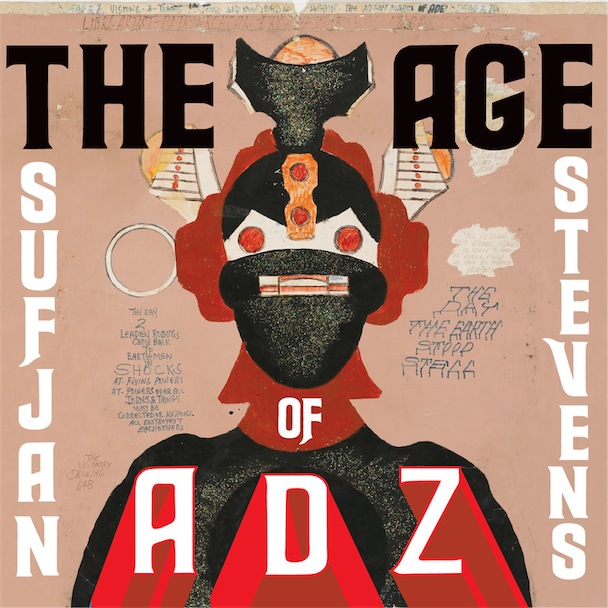 Sufjan Stevens
Sufjan StevensThe Age of Adz
Score: 78
Five years after his last LP, Illinois, thoroughly popular indie singer-songwriter Sufjan Stevens will release his newest album, The Age of Adz, in early October. The Age of Adz, while it keeps some of the sound of Stevens’s earlier albums, is a bit of divergence from style, especially when compared to Illinois’s elegantly ebullient sound. This new style certainly has some success, but it’s hard not to feel that Stevens has abandoned some of what made his music great, leaving The Age of Adz generally interesting but never quite absorbing.
Stevens takes a variety of instrumental approaches on The Age of Adz, each of which is generally quite successful. The first of these approaches is “Futile Devices“ ‘s delicately plinking intro - a constant sound, but one which is well-accented both by Stevens’s voice and by slight changes in the sound, both of which prevent the track from going old. After “Futile Devices,” the sound of second track “Too Much” is a bit of a shock. “Too Much” uses the same mellow tone as its predecessor, but with a new, slightly glitch-influenced electronic tone. From there, The Age of Adz goes through a number of other styles - and with contrasts like that between “Vesuvius“ ‘s intimate piano-driven sound and “Get Real Get Right“ ‘s gently pumping quasi-electric style, it never gets boring.
Sufjan Stevens’s music is nothing without his joyfully bright voice, and The Age of Adz is accordingly graced with his tones. In certain places - for example, the entirety of album opener “Futile Devices” - Stevens’s voice is just as sublime as it has been on his earlier work. Unfortunately, as the album progresses, Stevens’s voice becomes more and more clouded and obscured by various electronic elements and ill-advised effects. Occasionally the former state shows up, generally in the best parts of the album - but too often, Stevens’s voice simply isn’t allowed to shine through as it should be. The worst is undeniably the 25-minute gargantuan “Impossible Soul,” where Stevens’s voice suffers a hefty application of Auto-Tune.
The Age of Adz is a bit less lyrically metaphoric than some of Stevens’s earlier work, but that doesn’t stop it from being quite well-written. Highlights of the album’s elegant approach to imagery and meaning include the simple but clearly meaningful “Our words / Are futile devices” as well as the much less simple but equally evocative “Vesuvius / Are you ghost / Or the symbols of light / Or a fantasy host?” Both do an excellent job of drawing not only the images they contain but a lyrical background to their respective tracks, and it says quite a lot that The Age of Adz has quite a few lines like these.
Taken alone, The Age of Adz is certainly an interesting album. Given that it’s Sufjan Stevens’ return to full albums after five years of intriguing but not quite satisfying projects like The BQE, it’s even more so. While the Age of Adz doesn’t quite stand up to the standard set by Stevens’s earlier albums, that doesn’t make it a failure. Instead, it’s a step in a new direction - a direction that may not be entirely advisable, but an interesting direction nonetheless.
This post is tagged 70-79, Sufjan Stevens